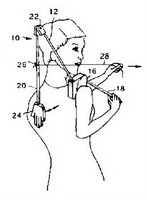An anniversary, an ending, and a new beginning
I searched "anniversary" on google images, and this one leaped right out at me:

Happy anniversary to me! I'm a sucker for a woman in high-cut knickers and a halo.
One year ago today, I started blogging by posting some thoughts on the Terri Schiavo controversy.
Twelve months have now passed … and it's time to drive a stake through the heart of Simply Put. We'll leave it out there in cyberspace, orbitting forever like debris cast off from a space station.
When I started Ragged Glory, I tried to compartmentalize myself, segregating my thoughts into a secular blog and a Christian blog. I wasn't able to manage it very successfully, so I am decommissioning both my blogs. (Ragged Glory readers won't want to miss my final post over there.)
And now introducing … (drum roll, please) …
As the header indicates, I'm going to focus primarily on theological posts. But the greater goal is to reintegrate the constitutent parts of my psyche.
In other words, I will continue to offer social and political commentary. And occasionally I'll throw around opinions on subjects I know nothing about, to prove that nothing has actually changed.
There you have it: an anniversary, an ending, and a new beginning.
 In case some of you don't follow me to the new URL … thanks for sharing your opinions with me over the past year. I'm sure you were far more patient with my B.S. than I deserved.
In case some of you don't follow me to the new URL … thanks for sharing your opinions with me over the past year. I'm sure you were far more patient with my B.S. than I deserved.The purpose of Simply Put was to encourage respectful dialogue on some rather complex and controversial topics, and you delivered magnificently. Give yourselves a pat on the back!
But hands off the haloed woman — she's all mine.
~~~~~~~~~~~~~
copyright © 2006, Stephen Peltz